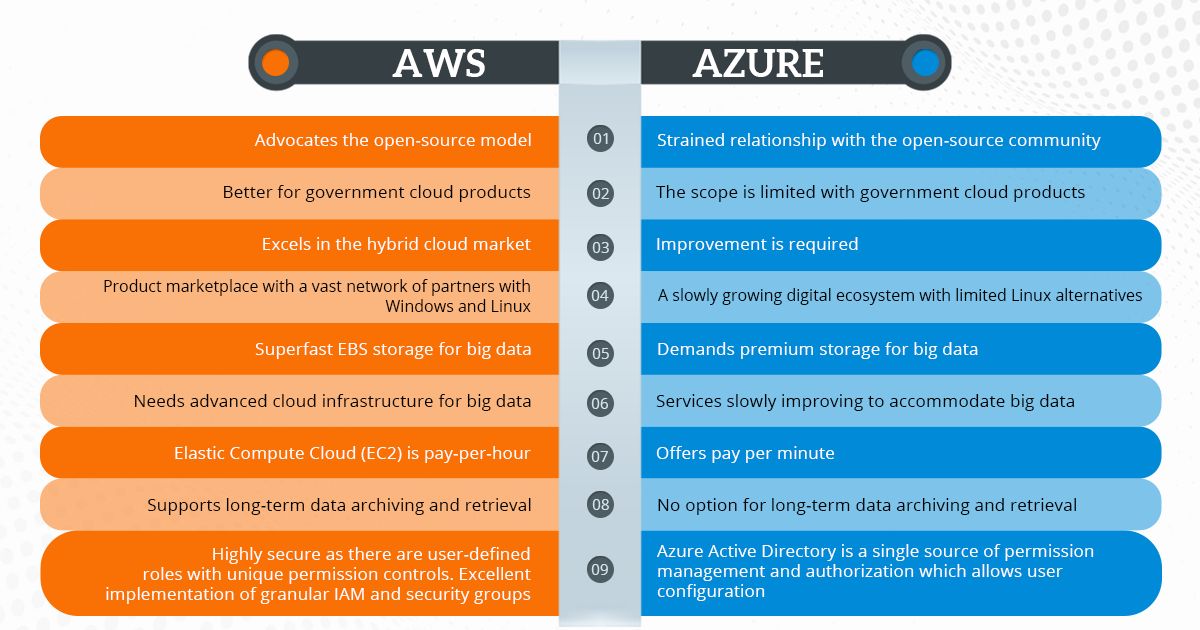Cloud computing offers the convenience of accessing essential business data and files from anywhere, anytime. The digital age has enabled the availability of cloud services for businesses of all sizes and it has become imperative that the right cloud services are availed of by enterprises, especially small and medium companies to maximize benefits and improve productivity.
A cloud-based service is a cost-effective and time-saving option for Small and Medium Enterprises (SMEs). SMEs need to ensure that cloud providers are offering a seamless and competitive service experience for their customers. Regular fluctuations in growth and development also have a major impact on IT needs and cloud computing offers the flexibility SMEs require to adjust to these varying demands.
Azure from Microsoft and Amazon Web Services (AWS) are two of the largest and the most developed cloud computing platforms offering a variety of benefits to users. However, it is important to analyze and choose the option that best fits the needs of an SME.
A research report from Flexera shows that 80% of the enterprises are currently using Azure as against 77% last year. AWS’ market share meanwhile has dropped to 77% from 79% in the same period.
Choosing a cloud platform for an SME is a significant decision that lays the foundation for business performance and enhancing customer experience. Growing businesses will benefit from the scalability and advanced IT automation capabilities offered by cloud-computing platforms. To leverage this potential, the ideal cloud platform needs to balance connectivity, cost, and available features.

With its extensive experience in implementing cloud platforms for various enterprises, Gemini Consulting & Services is well placed to help SMEs to select the right cloud platform that meets their business requirements. Contact us to deploy the cloud platform that offers the best possible business outcome.
For the benefit of prospective SME users, let us evaluate these two platforms based on various criteria.
Ease of Use
When it comes to usability, Azure is an easy choice as it is Microsoft’s public cloud computing platform. It can easily integrate with other Microsoft programs already in use. From a development perspective, the platform’s familiar setup allows businesses to set up their cloud computing quickly and confidently. AWS offers multiple customization options, but it requires a much steeper learning curve that could be a roadblock for developers who are not already familiar with it. This should influence the choice since not all SMEs may not have the budget to invest in a strong IT support team.
Flexibility
Most SMEs focus on growth and hence function with a wide variety of apps available that help with their ever-changing business requirements. SMEs would be looking for apps that are flexible enough to accommodate these changes quickly. While both Azure and AWS services offer excellent app deployment options, AWS has the edge when it comes to configurations. To utilize this advantage, developers have to be familiar with the platform. Microsoft on the other hand has the advantage of having pre-existing cloud apps. When new features get added to Azure, Microsoft leverages its development knowledge to create the most comprehensive cloud environment for its platform clients.
Hybrid Environment
Microsoft pioneered the introduction of the hybrid cloud anticipating and understanding that some companies may not be ready to fully deploy their systems in the cloud. A hybrid cloud allows these businesses to have the best of both worlds while allowing a seamless transition into a full cloud environment. Therefore, SMEs tilting towards a hybrid solution will find significant support from Microsoft Azure, easing up the process of integration. While Amazon works to catch up in the area it still lacks hybrid support when compared to Microsoft.
Best Pricing
On the face of it, AWS appears to be the lower-priced option. But Azure offers a few advantages that help even out this playing field. Both Amazon and Microsoft follow pay per use model. The difference lies in how these options are structured. While AWS charges by the hour, Azure users pay by the minute. Depending on usage, Microsoft users may be more precise as there is no payment required for unused minutes. For businesses with heavy usage, the flat monthly rate offered by Azure can be the better option. Similarly, for businesses already using the Microsoft suite, the brand’s enterprise agreement offers further savings, helping to balance out the cost of a large IT department.

While AWS and Azure offer essentially the same basic capabilities around flexible computing, storage, networking, and pricing and share common elements of a public cloud, making a choice becomes easier if businesses answer the following questions.
- What Type of Computing Power will be needed?
- How Much Storage will the Company Infrastructure Require? While both offer block and object storage options, break this down into granular details and compare.
- What type of database will be needed? What is the focus on? Durability or user experience?
- What network capabilities will be needed?
- What is the affordability?
In conclusion, if you are looking for a solid infrastructure as a service or a wide range of services and tools then AWS is the right choice. If you are looking for windows integration or a good Platform as a Service (PaaS)- based provider, then choose Azure.



